- Home
- Greg Keyes
The Charnel Prince Page 4
The Charnel Prince Read online
Page 4
“You—you want us to—?”
“It’s only difficult the first time,” Rediana promised. “And not so hard as that. The money is easy, and you’ve got that young swordsman to look out for you, if you come across a rough customer. He works for me already, you know.”
“Cazio?”
“Yes. He looks after some of the girls.”
“And he put you up to this?”
She shook her head. “No. He said you would turn your noses up at me. But men often don’t know what they’re talking about.”
“He does this time,” Anne said, her voice frosty. “Thank you very much for your help with the fish, but I’m afraid we must decline your offer.”
Rediana’s eyes sharpened. “You think you’re too good for it?”
“Of course,” Anne said, before she could think better of it.
“I see.”
“No,” Anne said. “No, you don’t. I think you’re too good for it, too. No woman should have to do that.”
That put a queer little smile on Rediana’s face. But she shrugged. “Still you don’t know what’s best for you. You could earn more in a day than you do now in a month, and not ruin your looks with scrubwork. Think about it. If you change your mind, I’m easy enough to find.” With that, she sauntered off.
The two girls walked in silence for a few moments after Rediana left them. Then Austra cleared her throat. “Anne, I could—”
“No,” Anne said angrily. “Thrice no. I would rather we never made it home, than on those terms.”
Anne was still fuming when they reached the carenso at the corner of Pari Street and the Vio Furo, but the smell of baking bread put everything from her mind but her hunger. The baker—a tall, gaunt man always covered in flour—gave them a friendly smile as they entered. He was slashing the tops of uncooked country loaves with a razor while behind him his assistant slid others into the oven on a long-handled peel. A large black dog lying on the floor looked up sleepily at the girls and put his head back down, thoroughly uninterested.
Bread was piled high in baskets and bins, in all shapes and sizes—golden brown round loaves the size of wagon wheels and decorated with the semblance of olive leaves, rough logs as long as an arm, smaller perechi you could wrap one hand around, crusty egg-shaped rolls dappled with oats—and that was just at first glance.
They spent two minsers on a warm loaf and turned their feet toward the Perto Veto, where their lodgings were located.
There they walked streets bounded by once-grand houses with marble-columned pastatos and balconied upper windows, picking their way through a shatter of unreplaced roof tiles and wine carafes, breathing air gravid with the scents of brine and sewage.
It was four bells, and women with low-cut blouses and coral-red lips—ladies of Rediana’s profession—were already gathered on the upper-story balconies, calling to men who seemed as if they might have money and taunting those who did not. A knot of men on a cracked marble stoop passed around a jug of wine and whistled at Anne and Austra as they went by.
“It’s the Duchess of Herilanz,” one of the men shouted. “Hey, Duchess, give us a kiss.”
Anne ignored him. In her month quartered in the Perto Veto, she had determined that most such men were harmless, though annoying.
At the next cross-street they turned up an avenue, entered a building through an open door, and climbed the stairs to their second-floor apartment. As they approached, Anne heard voices above—z’Acatto and someone else.
The door was open, and z’Acatto glanced up as they entered. He was an older man, perhaps fifty, a bit paunchy, his hair more gray than black. He sat on a stool talking to their landlord, Ospero. The men were of about the same age, but Ospero was nearly bald, and stockier yet. They both looked pretty drunk, and the three empty wine carafes that lay on the floor confirmed that impression. There was nothing unusual about that—z’Acatto stayed drunk most of the time.
“Dena dicolla, casnaras,” z’Acatto said.
“Good evening, z’Acatto,” Anne returned, “Casnar Ospero.”
“You’re home early,” z’Acatto noticed.
“Yes.” She didn’t elaborate.
“We brought fish and bread,” Austra said brightly.
“That’s good, that’s good,” the old man said. “We’ll need a white with that, perhaps a vino verio.”
“I’m sorry,” Austra said. “We didn’t have money for wine.”
Ospero grunted and produced a silver menza. He squinted at it, then flipped it toward Austra. “That for the wine, my pretty della.” He paused a bit to leer at the two girls, then shook his head. “You know the place by Dank Moon Street? Escerros? Tell him I sent you. Tell him that will buy two bottles of the vino verio, or I’ll come crack his head.”
“But I was—,” Austra began.
“Go on, Austra. I’ll cook the fish,” Anne said. She didn’t like Ospero. There seemed something vaguely criminal about him and his friends. On the other hand, z’Acatto had somehow managed to convince him to rent them their rooms on credit for a week, and he had never done more than leer at her. They relied on his good graces, so she held her tongue.
She went to the cramped pantry and took out a jar of olive oil and a pouch of salt. She put a little of the oil into a small earthenware crematro, sprinkled both sides of the fish with salt, and placed it in the oil. She stared despondently at the preparation, wishing for the hundredth time that they could afford—or even find—butter for a change. Then she sighed, put the lid on the crematro, and carried it back down the stairs, then through an inner first floor door into the small courtyard that was shared by the building’s inhabitants.
A few women were gathered around a small pit of glowing coals. There wasn’t yet room for her dish, so she took a bench and waited, gazing absently around the dreary walls of flaking stucco, trying to imagine it as the orchard courtyard in her father’s castle.
A male voice foiled her attempt. “Good evening, della.”
“Hello, Cazio,” she said without turning.
“How are you this evening?”
“Tired.”
She noticed there was room at the fire now, and stood to take the crematro over to it, but Cazio interposed himself.
“Let me,” he said.
Cazio was tall and lean, only slightly older than Anne, dressed in dark brown doublet and scarlet hose. A rapier in a battered scabbard hung at his side. His dark eyes peered down at her from a narrow, handsome face. “Your day didn’t go well?”
“Not as well as yours, I’m sure,” she replied, handing him the crematro.
“What do you mean by that?”
“I mean the work you’ve chosen must give you ample opportunity for refreshment.”
He looked puzzled.
“And don’t try to look coy,” she said. “I spoke with Rediana today. She told me what you’ve been doing.”
“Ah,” he said. He went over to place the roasting pan on the ashes and used a charred stick to bank them up around the edges. Then he came back and sat next to her. “You don’t approve?”
“It’s nothing to me.”
“It ought not to be. I’m doing this for you, remember? I’m trying to earn passage for us to escort you home.”
“And yet we seem no nearer to departing than we were a month ago.”
“Sea passage does not come cheap, especially when the cargo must remain secret. Speaking of which, take especial care. There are more men searching the streets for you than ever. I wonder if you know why.”
“I’ve told you, I don’t.” It wasn’t exactly a lie. She had no idea why there was a price on her head, but she figured it had to do somehow with her station and the dreams that troubled even her waking hours. Dreams that she knew came from—elsewhere.
“I took your word for silver,” he said, “and I still do. But if there is any suspicion you have . . .”
“My father is a wealthy and powerful man. That’s the only cause I can imagine.”
>
“Do you have some rival who vies for his affections? A stepmother, perhaps? Someone who would prefer not to see you return?”
“Oh, yes, my stepmother,” Anne said. “How could I have forgotten? There was that time when she sent me out with the huntsman and told him to bring my heart back. I would have died, then, if the old fellow hadn’t taken a shine to me. He took her back the heart of a boar instead. And then there was that other time, when she sent me to fetch water, never mentioning the nicwer that lived in the stream, waiting to charm me and eat me. Yes, those events should have been clues to my present situation, but I suppose I didn’t suspect her because dear father assured me she has changed so.”
“You’re being sarcastic, aren’t you?” Cazio guessed.
“This isn’t a phay story, Cazio. I don’t have a stepmother. There’s no one in the family who would wish me ill. My father’s enemies might, on the other hand, but I couldn’t say exactly who they are. I’m not very political.”
Cazio shrugged. “Ah, well.” Then a smile brightened his face. “You’re jealous,” he accused.
“What?”
“I’ve just figured it out. You think I’m sleeping with Rediana’s ladies, and you’re jealous.”
“I am not jealous,” Anne said. “I already have a true love, and he is not you.”
“Oh, yes, the fabled Roderick. A wonderful man, I hear. A true prince. I’m sure he would have answered your letter, if given another few months to get around to it.”
“We’ve been around this before.” Anne sighed. “Escort whomever you wish, do with them what you will. I am grateful to you, Cazio, for all your help, but—”
“Wait.” Cazio’s voice was clipped now, his face suddenly very serious.
“What is it?”
“Your father sent you to the coven Saint Cer, didn’t he?”
“It was my mother, actually,” she corrected.
“And did your true love Roderick know where you were bound?”
“It all happened too quickly. I thought I was going to Cal Azroth, and told him that, and then that very night my mother changed her mind. I had no way to send him word.”
“He couldn’t have discovered it through gossip?”
“No. I was sent away in secret. No one was supposed to know.”
“But then you dispatched a letter to your beloved—a letter I delivered to the Church cuveitur myself—and in a matter of ninedays those knights came to the coven. Doesn’t that strike you as suspicious?”
It did strike—it struck like tinder in Anne’s breast.
“You go too far, Cazio. You have slandered Roderick before, but to suggest—to imply . . .” She stammered off, too angry to continue, all the more because it made a sort of sense. But it couldn’t be true, because Roderick loved her.
“The knights were from Hansa,” she said. “I knew their language. Roderick is from Hornladh.”
But silently she remembered something her aunt Lesbeth once told her. It seemed long ago, but it was something about Roderick’s house being out of favor at court because they had once supported a Reiksbaurg claim to the throne.
No. It’s ridiculous.
She was about to tell Cazio that when Austra suddenly burst into the courtyard. She was out of breath, and her face was flushed and wet with tears.
“What’s wrong?” Anne asked, taking Austra’s hands.
“It’s horrible, Anne!”
“What?”
“I s-s-saw a cuveitur. He was giving out the news in the square, by the wine shop. He’d just come from— Oh, Anne, what shall we do?”
“Austra, what?”
Her friend bit her lip and looked into Anne’s eyes. “I have terrible news,” she whispered. “The worst in the world.”
CHAPTER THREE
THE COMPOSER
LEOVIGILD ACKENZAL STARED AT the spear with a mixture of fear and annoyance.
The fear was entirely rational; the sharp end of the weapon was poised only inches from his throat, and the man holding the shaft was large, armored, and mounted on a ferocious-looking steed. His iron-gray eyes reminded Leoff of the pitiless waters of the Ice Sea, and it seemed to him that if this man killed him, he would not even remember him in the morning.
There was certainly nothing he could do to stop the fellow if murder was on his mind.
That he should also be annoyed was quite irrational, he supposed, but in truth it had little to do with the armored man. Days before—in the hill country—he’d heard a faint melody off in the distance. No doubt it had been some shepherd playing a pipe, but the tune had haunted him ever since, the worse because he’d never heard the end of it. His mind had completed it in a hundred ways, but none of them were satisfactory.
This was unusual. Normally, Leoff could complete a melody without the slightest effort. The fact that this one continued to elude him made it more tantalizing than a beautiful, mysterious—but reluctant—lover.
Then, this morning, he’d awoken with a glimmer of how it ought to go, but less than an hour on the road brought this rude interruption.
“I have little money,” Leoff told the man truthfully. His voice shook a bit as he said it.
The hard eyes narrowed. “No? What’s all that on your mule, then?”
Leoff glanced at his pack animal. “Paper, ink, my clothes. The large case is a lute, the smaller a croth. Those smallest ones are various woodwinds.”
“Auy? Open them, then.”
“They won’t be of any value to you.”
“Open them.”
Trying not to take his gaze off the man, Leoff complied, opening first the leather-bound case of the lute, which sounded faintly as the gourd-shaped back bumped against the ground. Then he proceeded to unpack the rest of his instruments; the eight-stringed rosewood croth inlaid with mother-of-pearl that Mestro DaPeica had given him years ago. A wooden flute with silver keys, an hautboy, six flageolets of graded sizes, and a dark red krummhorn.
The man watched this with little expression. “You’re a minstrel, then,” he said at last.
“No,” Leoff replied. “No, I’m not.” He tried to stand taller, to make the most of his average height. He knew there was little intimidating about his hazel eyes, curly brown hair, and boyish face, but he could at least be dignified.
The fellow raised an eyebrow. “Then what exactly are you?”
“I’m a composer.”
“And what does a composer do?” the man asked.
“He composes music.”
“I see. And how does that differ from what a minstrel does?”
“Well, for one thing—”
“Play something,” the man interrupted.
“What?”
“You heard me.”
Leoff frowned, his annoyance growing. He looked around, hoping to find someone else, but the road stretched empty so far as the eye could see. And here in Newland, where the terrain was as level as a sounding board, that was very far indeed.
Then why hadn’t he seen the approach of the man on a horse?
But the answer to that lay in the melody he’d been puzzling over. When he heard music in his head, the rest of the world simply didn’t matter.
He picked up the lute. It had gone out of tune, of course, but not badly, and it was only a moment’s work to set it right again. He plucked out the melody line he’d been working on.
“That’s not right,” he murmured.
“You can play, can’t you?” the mounted man challenged.
“Don’t interrupt me,” Leoff said absently, closing his eyes. Yes, there it was, though he’d lost the end.
He started into it, a single line on the top string, rising in three notes, dropping into two, then tripping up the scale. He added a bass accompaniment, but something about it didn’t fit.
He stopped and started again.
“That’s not very good,” the man said.
That was too much, spear or no. Leovigild turned his eyes on the fellow. “It would be qui
te good if you hadn’t interrupted me,” he said. “I almost had this in my head, you know, perfect, and then along you come with your great long spear and . . . What do you want with me, anyway? Who are you?” He noticed distantly that his voice wasn’t shaking anymore.
“Who are you?” the man asked placidly.
Leoff drew himself up straight. “I am Leovigild Ackenzal,” he said.
“And why do you approach Eslen?”
“I have an appointment to the court of His Highness, William the Second, as a composer. The emperor has a better opinion of my music than you do, it seems.”
Bizarrely, the man actually smiled. “Not anymore, he doesn’t.”
“What do you mean?”
“He’s dead, that’s what I mean.”
Leoff blinked. “I . . . I didn’t know.”
“Well, he is. Along with half the royal family.” He shifted in his saddle. “Ackenzal. That’s a Hanzish-sounding name.”
“It is not,” Leoff replied. “My father was from Herilanz. I myself was born in Tremar.” He pursed his lips. “You aren’t a bandit, are you?”
“I never said I was,” the fellow replied. “I haet Artwair.”
“You are a knight, Sir Artwair?”
Again, that ghost of a smile. “Artwair will do. Do you have a letter proving your claim?”
“Ah, yes. Yes, I do.”
“I would very much like to see it.”
Wondering why Artwair should care, Leoff nevertheless rummaged through his saddle pack until he found a parchment with the royal seal. He handed it to the warrior, who examined it briefly.
“This looks in order,” he said. “I’m returning to Eslen just now. I’ll escort you there.”
Leoff felt the muscles of his neck unknotting. “Very kind of you,” he said.
“Sorry if I gave you a fright. You shouldn’t have been traveling alone, anyway—not in these times.”
By noon, the infant-eyed sky of morning was cataracted an oppressive gray. This did nothing to improve Leoff’s mood. The landscape had changed; no longer totally flat, the road now ran alongside some sort of embankment or ridge of earth. It was so regular in shape, it seemed to him that it must be man-made. In the distance he could see similar ridges. The strangest things were the towers that stood on some of them. They looked as if they had huge wheels fixed to them, but with no rims, only four big spokes covered in what looked like sailcloth. They turned slowly in the breeze.

 Godzilla
Godzilla Godzilla vs. Kong
Godzilla vs. Kong XCOM 2- Resurrection
XCOM 2- Resurrection Independence Day: Crucible (The Official Prequel)
Independence Day: Crucible (The Official Prequel)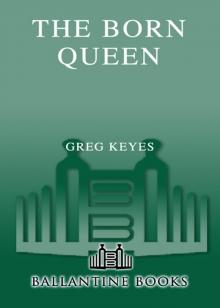 The Born Queen
The Born Queen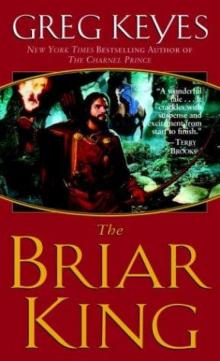 The Briar King
The Briar King Star Wars The New Jedi Order - Dark Journey - Book 10
Star Wars The New Jedi Order - Dark Journey - Book 10 Star Wars: New Jedi Order Book 8b: Emissary of the Void
Star Wars: New Jedi Order Book 8b: Emissary of the Void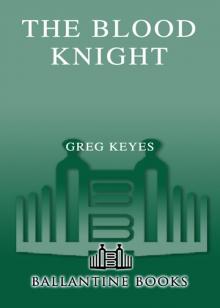 The Blood Knight
The Blood Knight Star Wars - Edge of Victory - Book 1: Conquest
Star Wars - Edge of Victory - Book 1: Conquest Edge of Victory 2 Rebirth
Edge of Victory 2 Rebirth Lord of Souls: An Elder Scrolls Novel
Lord of Souls: An Elder Scrolls Novel The Born Queen tkotab-4
The Born Queen tkotab-4 Rebirth: Edge of Victory II
Rebirth: Edge of Victory II Conquest: Edge of Victory I
Conquest: Edge of Victory I Emissary of the Void
Emissary of the Void The Blackgod
The Blackgod Star Wars The New Jedi Order - The Final Prophecy - Book 19
Star Wars The New Jedi Order - The Final Prophecy - Book 19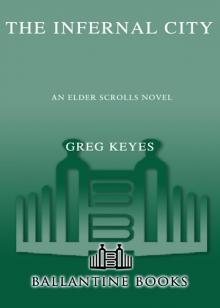 The Infernal City
The Infernal City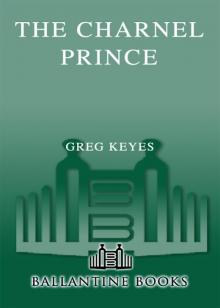 The Charnel Prince
The Charnel Prince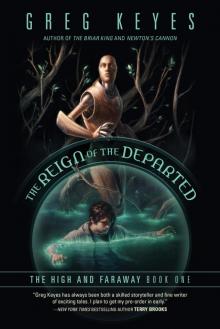 The Reign of the Departed
The Reign of the Departed Lord of Souls es-2
Lord of Souls es-2 Chosen of the Changeling
Chosen of the Changeling Dawn of the Planet of the Apes
Dawn of the Planet of the Apes Footsteps in the Sky
Footsteps in the Sky PACIFIC RIM UPRISING ASCENSION
PACIFIC RIM UPRISING ASCENSION The Final Prophecy: Edge of Victory III
The Final Prophecy: Edge of Victory III